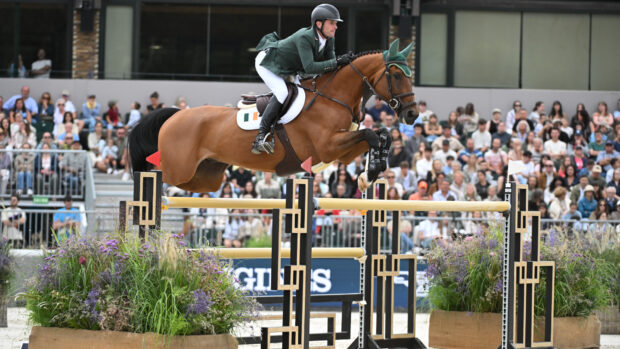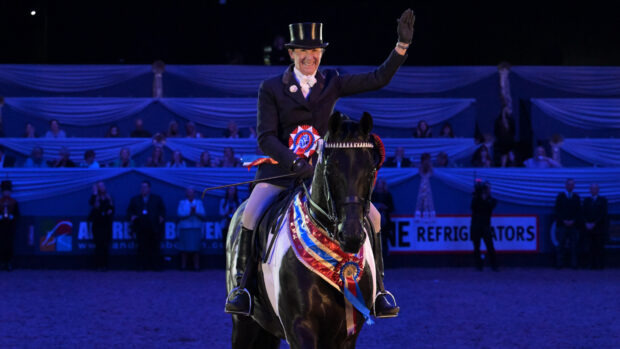An investigation will be held into why the showjumping tour in Valencia continued after show organisers had been told to halt competition.
As more news comes to light about the equine herpes virus outbreak (EHV-1) that started at the CES Valencia Tour in Spain last month, the FEI has provided clarification on a number of concerns raised about the handling of the outbreak.
On the afternoon of 20 February, the FEI veterinary delegate at the CES Valencia Tour told the FEI veterinary department 11 horses at the venue had developed a fever. This increased to 20 later in the day. The FEI told organisers to halt competition, but classes continued to run the following day.
“Following receipt of the detailed information sent to the FEI on 20 February, the FEI concluded that there was an outbreak of the neurological form of EHV-1 and immediately told organisers and on-site officials to cancel the rest of the event in Valencia,” an FEI spokesman told H&H.
“On Sunday 21 February, as soon as the FEI learned that competition was still ongoing, the FEI veterinary director immediately sent a strong message to Valencia reinforcing the notification from the previous day that competition had to cease immediately.”
In a virtual press conference today (9 March) the FEI confirmed to H&H that it will be holding a “full and thorough” investigation.
“This will be made available so everybody understands the findings of the investigation,” said FEI secretary general Sabrina Ibáñez.
The 2021 European Dressage Championships for children, juniors and young riders is scheduled to take place at CES Valencia from 5 to 11 July.
“The European championships are allocated by the FEI board so any decision regarding whether or not they should be removed or maintained in Valencia will have to be taken by the board,” said Ms Ibáñez.
“We will be addressing this with the board once we have more information on the investigation. It will be the board that will ultimately need to take the decision.”
Ms Ibáñez provided an update on the current situation in Valencia and said the clinical situation had “improved dramatically” and communication had also improved. She added that there had been “a lot of misinformation” about what has taken place in Valencia.
“There is enough hay and food for the horses – as well as enough food for the grooms and riders,” she said.
FEI veterinary director Göran Åkerström added that on 26 February, in accordance with Spanish law, the Spanish authorities took over the decisions at the venue.
“Later that week we were alerted by riders desperate for help because the clinical situation for their horses had become very serious. We immediately got in touch with the Spanish federation who set up a meeting and we decided to get supporting veterinarians on to site. We worked closely with the German and French federations who have been absolutely amazing in support,” said Åkerström.
“We gathered a team of really good vets; the first arrived on the morning of 26 February and took control over the treatment situation on the site together with the organising committee’s veterinarians who were working hard, but in very severe conditions. The University Hospital of Valencia has also been incredible in the way they have been supportive, up to 10 of their vets went to the venue to support our team.”
Mr Åkerström confirmed that the highest number of vets treating horses at the venue was 21.
“There is no doubt that there were 21, but also the clinical situation changed from day to day. It was dependent on how available the vets from the university hospital were,” he said.
“The day when there was 21 vets [on site] was when there were 10 vet from the university hospital available – otherwise there have been between eight and 11 vets [on site] most of the time”.
Article continued below…

EHV not yet under control as 10 horses now dead *H&H Plus*

Equine herpes virus – all you need to know right now

EHV-1: Eventing, dressage and showjumping stand together to protect UK herd
British equestrian sport governing bodies have shared protocols for horses travelling to the UK from a number of countries, following
Ms Ibanez said the FEI’s main priority has and always will be the safety of the horses.
“We are really focusing now on getting these horses healthy, home and also making sure there is no further spread of this disease,” she said.
H&H has contacted CES Valencia for comment.
Horse & Hound magazine, out every Thursday, is packed with all the latest news and reports, as well as interviews, specials, nostalgia, vet and training advice. Find how you can enjoy the magazine delivered to your door every week, plus options to upgrade to access our H&H Plus online service which brings you breaking news as it happens as well as other benefits.




